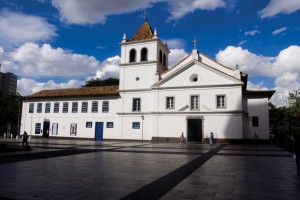Being confident of this very thing, that He who has begun a good work in you will complete it until the day of Jesus Christ. -Philippians 1:6
On the 3rd of April, there was a big celebration in the local Catholic churches because Pope Francis canonized Fr. José de Anchieta, a Jesuit missionary who is considered as one of founders of the city of São Paulo.
Fr. José was originally from the Canary Islands, Spain. He came from a wealthy family but decided to leave everything behind to answer his call to the priesthood. He eventually became ill while he was a novice and some sources say this was due to his excessive austerity. The Jesuit Order decided to send him to Brazil hoping that the weather would help his health. He did not particularly have a call to serve the people of Brazil. He came here because of illness and God used this to transform this man into an apostle of the gospel here.
Fr. José and several Jesuit missionaries arrived in the coastal village of São Vicente. There they heard about a small settlement of indigenous people inland who had been exposed to systematic violence and exploited by the Portuguese colonists. This settlement was caught between two worlds; their tribal heritage and the world of colonists. Some of the children of these indigenous people were of mixed heritage. The Jesuits being strong educationalists, they did what they know best: they founded a school. However, the school was just a premise for them to protect the indigenous people against the colonists. The Jesuits missionaries eventually developed a genuine love for the people and they even risked their lives for the well-being of these people. Even though we know that historically the Jesuits were not all saints and I don’t think even Fr. Anchieta was an exception. However, Fr. Anchieta is known today for not for his faults, but for the his willingness to be God’s instrument of love and justice despite his personal faults. When he died, thousands of indigenous people mourned for him.
The place where the school was founded is called “Pátio do Colégio”. It is also known as the birthplace of the city of São Paulo. It is located in the old city center where we work. After five hundred years, the Pátio do Colégio still is a haven for those who are forgotten and treated with disdain. In the evenings, several hundred homeless people sleep in the square of this historic school. The homeless come here for two particular reasons. It is a safe place and throughout the night several religious groups bring warm meals to these people. Among these homeless, there are about a hundred children.
The Pátio do Colégio has been a good contact point for us. We have met many children here over the past few months. These children are new to the streets. Most of them come from a neighborhood that near the center. Sad to say, the Pátio do Colégio is safer than their own neighborhood. These are children are truly lost; they don’t have many options. They are looking for a safe place. They are feeling lost and abandoned. The Jesuit priests started the school to help the indigenous people know God did not abandon them. It was not just an academic center but it was a center where people learned that they were precious beings who have much to offer to this world.
It is humbling for us to know that we are not here to start anything new. We are merely continuing the work the Holy Spirit started five hundred years ago. Fr. Anchieta and the Jesuit missionaries set the example for us. Now it is our turn to take up the fight and preach God’s gracious love to the lost and forgotten of this generation.
Last week, after five hundred years, Fr. Anchieta was remembered in this world. He died a simple missionary who learned to love a people that everyone despised. I think this was sufficient for him. We hope to follow in his footsteps.


